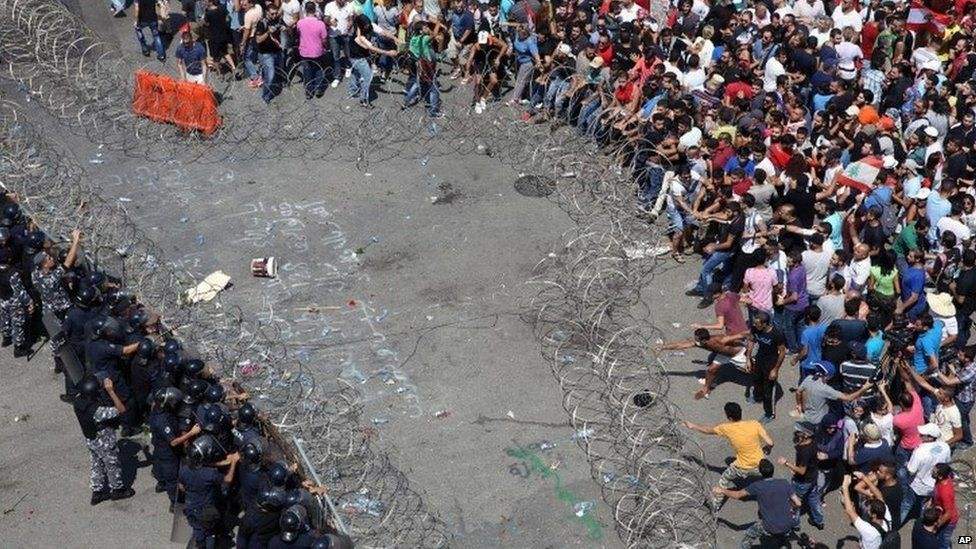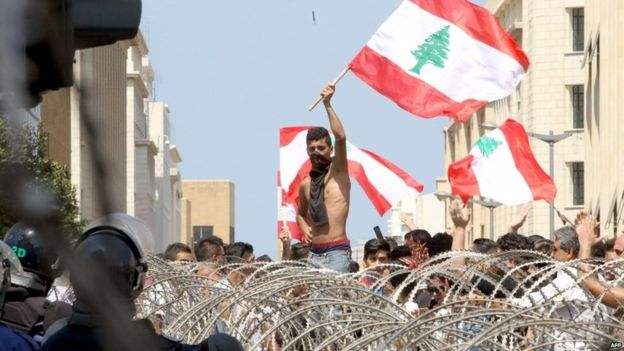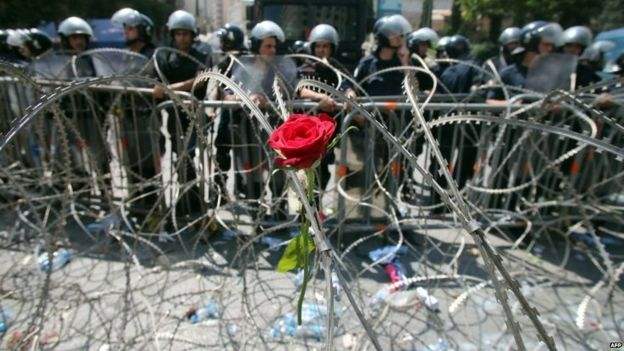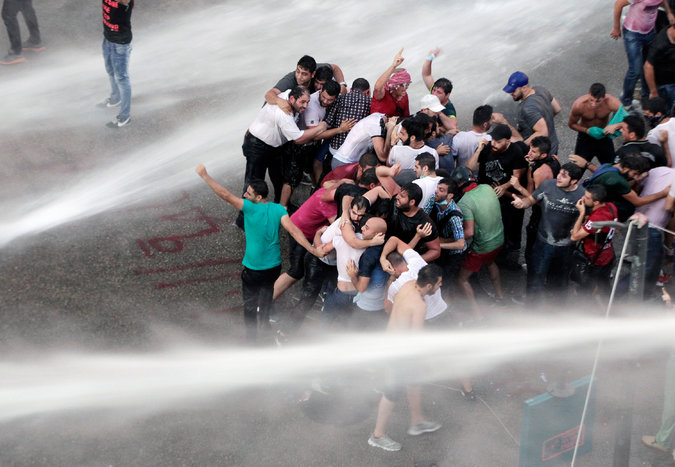



.jpg)
BBEIRUT, Aug 23 (Reuters) - Lebanon's prime minister threatened to resign on Sunday, warning rival parties in his unity cabinet that the state faced collapse because of paralysis that has come to a head with its failure to resolve a crisis over rubbish disposal.
Protesters called for a second day of demonstrations against Prime Minister Tammam Salam's cabinet on Sunday after at least 35 people were injured on Saturday night when security forces used water cannons and tear gas to disperse several thousand demonstrators in central Beirut.
Salam's government has suffered almost complete paralysis since it took office last year as wider crises in the Middle East, including the war in neighboring Syria, have exacerbated Lebanon's own political and sectarian divisions.
"I warn that we are going are going towards collapse if matters continue," Salam said in a televised address. "Frankly, I have not and will not be a partner in this collapse. Let all officials and political forces bear their responsibilities."
 Lebanese Prime Minister Tammam Salam speaks during a press conference at the government palace in Beirut, Lebanon, Sunday, Aug. 23, 2015.
Lebanese Prime Minister Tammam Salam speaks during a press conference at the government palace in Beirut, Lebanon, Sunday, Aug. 23, 2015. He described as excessive the force used against protesters on Saturday and said those responsible would be held to account.
On Sunday, several hundred protesters gathered near the government headquarters on Sunday chanting anti-government slogans. Activists called for a bigger protest later in the day.
Their campaign "You Stink" is a response to trash being left uncollected in and around Beirut last month when a refuse tip closed, with no agreement on an alternative. While collection has resumed, no solution has been found.
"POLITICAL GARBAGE"
The Salam government brings together rival Lebanese parties, including the Sunni-led Future Movement of Saad al-Hariri, Shi'ite Hezbollah, and competing Christian groups.
Should it collapse, Salam's government would stay on in the caretaker capacity. However, his resignation would trigger a constitutional crisis. In Lebanon, it is the president who appoints the prime minister, but the presidency has been vacant since last year.
Salam said that if a cabinet meeting scheduled for Thursday was not productive on issues including a tender to decide on a new refuse collection company, "there would be no necessity for the government after it."
"The trash is the straw that broke the camel's back, but the story is much bigger than this straw. It is the story of the political garbage in the country and the political trash in the country," Salam said.
He also warned the heavily indebted government would be unable to pay salaries next month. Unable to issue new debt, it risked being classified "among the failing states."
Lebanon's public debt currently stands at about 143 percent of gross domestic product, a government source said.
Lebanon, still rebuilding from its 1975-1990 civil war, has been repeatedly jolted by spillover from the Syria war, including political violence and a major refugee crisis.
(Writing by Suleiman al-Khalidi in Amman; Editing by Tom Perry and Raissa Kasolowsky)
Al Jazeera
Protesters sparked by garbage problem turn sites on broader government dysfunction; prime minister calls cabinet meeting
Thousands of protesters gathered in the streets of Beirut on Sunday, a day after police fired tear gas, rubber bullets and water cannons at demonstrators who were protesting against what they call Lebanon's overall political dysfunction.
Protesters had camped overnight in the Lebanese capital's Riad al-Solh square to wait for Prime Minister Tammam Salam's response to Saturday's police violence.
In a televised address on Sunday morning, Salam said members of the security forces would be held accountable for the violence against protesters. Salam also called on an emergency parliament session on Thursday to deal with the country's ongoing political crisis.
"I have been, like many other fellow Lebanese, patient enough, but yesterday's outcry should not be ignored," he said. "I was never in this for a position in government, I am one of you. I am with the people. Do not pit this conflict [as] one camp against the other. Target all the politicians."
Angered by Salam's speech on Sunday, a number of the protesters chanted, "The people want the fall of the regime."
Tensions in Lebanon have peaked recently after protests against the government's inability to ensure that rubbish is disposed of effectively. Last month, the country was left with mounting piles of rubbish after politicians, divided by regional and local conflict, were unable to agree where to dump the capital's refuse.
The crisis was temporarily resolved when the rubbish was finally cleared, but bickering within the government over which company to award the new contract has exposed it to allegations of corruption from opponents.
The prime minister said on Sunday that if legislators could not reach an agreement on the rubbish crisis on Thursday, there is a possibility the government will be dissolved.
"If the meeting is not productive, there is no need for the council of ministers all together," Salam said.
An online group named "You Stink!" along with other civil society groups organized this weekend's protests, calling on Lebanese people to join them in a revolt against what they call "a corrupt system."
Azza El Masri, a member of the "You Stink" campaign, told Al Jazeera that protesters are not backing down and that the protests will continue.
"We want Tammam Salam and all the political class to resign. When people were chanting that they wanted to topple the regime yesterday, they were serious. We want to topple [the government], and we won't stop until we do," El Masri said.
"YouReek or YouStink [protesters] have vowed to stay at Riad al-Solh until the Minister of Environment resigns, until those who were randomly arrested are freed, and until the riot police are held accountable for the violence," El Masri added.
Joey Ayoub, who is one of the organizers of "You Stink" and was present during the protests on Saturday and Sunday, said protesters were met with police brutality, tear gas canisters and water cannons.
"As one of those who helped organize this protest, I can safely tell you that the government’s reaction was beyond anything we were expecting," Ayoub said.
The Lebanese Red Cross said at least 15 civilians were injured during the protests on Saturday in addition to 35 officers.
BBC news:
Lebanese PM Tammam Salam has promised to take action against police who used force to disperse demonstrations against piles of uncollected rubbish.
He has warned that the country faces a political crisis and that there is no money to pay the salaries of a large number of public sector employees.
Demonstrators returned to the streets of central Beirut again on Sunday after dozens were wounded on Saturday.
Lebanon does not have a president and parliament remains in a stalemate.
Saturday's protest was attended by thousands and the biggest to date over uncollected rubbish.
Mr Salam said that those security forces guilty of injuring demonstrators would be held accountable.
He told a news conference on Sunday that the right to demonstrate was protected by the constitution.
On Saturday police fired tear gas, rubber bullets and water cannon against thousands of protesters in downtown Beirut. Gunfire echoed through the streets into the night.
At the same time Mr Salam has warned that the lack of a parliament may preclude the government from selling bonds, affecting the country's credit rating.
"The garbage crisis is what broke the camel's back, but the story is much bigger than this," Mr Salam was quoted by Bloomberg as saying.
"Did you know that because of the failure to take decisions, we may not be able to pay the salaries of a large number of public sector employees?"
He warned that Lebanon's inability to service the public debt through bond sales could result in the country's credit rating falling down to the ranks of the "failed states".
Protesters blame political paralysis and corruption for the failure to resolve the rubbish crisis.
It started after the closure of Beirut's main landfill site last month, and has spread to other parts of the country.
In recent weeks - during hot summer weather - piles of rubbish have grown so large that some residents resorted to burning rubbish on the streets, releasing toxic fumes.
Lebanon has been without a president for more than 450 days.
MPs have been unable to decide on a president, a mainly ceremonial role, reserved for a Christian in a sectarian power-sharing system.
They have extended their own terms twice, dismissing calls for elections and legitimate representation.